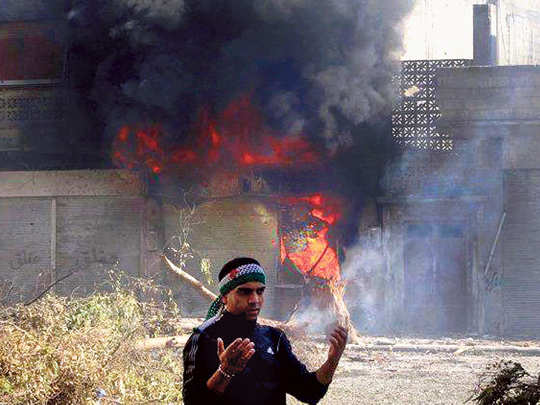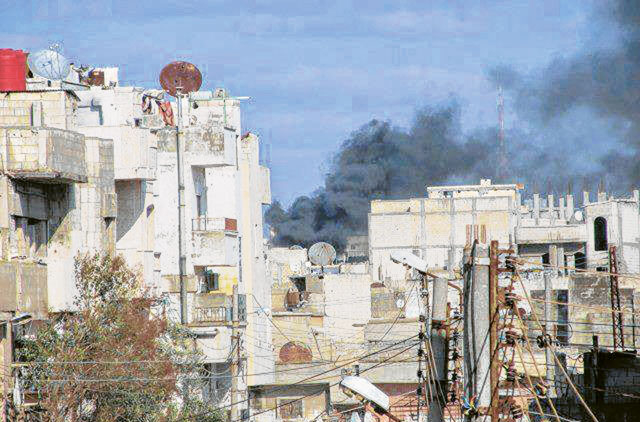
If you're going to die at the business end of an artillery shell, you have less than a second to make your peace.
When the rounds are incoming, that second feels like a lifetime.
It's a quick whistling sound - like ‘whizzzz.' Then a deafening ‘kerrummp' and it explodes and shakes the ground. All in less than a second. You'd never know what hit you.
You look around you to see where the dust and smoke are rising to the sky, then you thank the stars it didn't land near you. But somewhere, under that dust and smoke and ground-shaking kerrummp, bricks and mortar are gone, bodies vapourised or mangled beyond belief.
Every few minutes — 18 in one hour alone — the shells were whizzing and kerrumping over Baba Amr, the central district here in Homs held by the Free Syrian Army.
Sometimes there is a lull — have the gunners stopped for tea? But it always begins again, knotting your stomach like nothing before, rattling your nerves, making every nerve fibre in your body tingle — not in a good way.
For the past month, regular regime forces of President Bashar Al Assad have been trying to wrest districts of Homs back from the FSA forces.
So far, their superior weaponry, tanks, artillery and manpower have failed to quell the insurrection. Officially, some 500 people have been killed in a month of fighting in the city. If one Syrian army commander is to be believed, the toll is closer to 2,000.
No respite
Sitting on a plastic lawn chair, near the district of Inshaat, behind a wall of sandbags, oblivious to the sporadic shelling behind him, the young officer wore civilian clothes, plastic sandals and smoked Marlboros one after the other.
Despite the fact he had no uniform, there was no doubting who was in charge as he issued orders to the young men around him who manned checkpoints close to the Damascus Road near the old city centre.
The conversation, punctuated by the whizzing and kerrumping shells, was awkward. Why was the West intent of destroying Syria? And why did the Arab League want to fight its Arab brothers in Syria?
At every corner, soldiers crouched with Kalashnikovs at the ready, aimed down streets, scanning for opposition.
Tack tack tack tack tack. Five automatic shots come too close to where we sit on the plastic lawn chairs behind the sand bags.
Soldiers scurry, shout, check their curved magazines in the Kalashnikovs, take the weapons off safety, fire off some rounds at an apartment building about 300 metres away.
"Go," the officer says. "Go now."
He shouts an order in Arabic, and two young soldiers bring me back down the street and around a corner to a waiting driver.
"You're from Dubai?" one thin young unshaven soldier asks. "I worked at Axiom Telecom in Dubai for four years."
I want to ask him how do you go from working in a Dubai telephone shop to this corner of hell. A whizzing and kerrumping shell erases that thought as we scurry for the safety around the corner.
The official line from Damascus is that the operation in Homs is about eradicating terrorists and infiltrators who want to destabilise Syria.
Civil war
The reality on the ground is that this is a full-blown civil war in Homs.
The city is far from being under government control, despite its firepower. In the distance, between red water barrels and a mangle of wires, air-conditioners and satellite dishes, there are green and black Syrian flags flying defiantly.
Bursts of automatic fire echo down the streets and alleys of this city, the third-largest in Syria. If it falls, the artery between Damascus north to Aleppo and Turkey will be severed.
At the car, my driver is held against a villa wall by security forces.
The two soldiers alongside me pass me awkwardly over to these men in combat trousers and black leather jackets.
Two Kalashnikovs are trained on me as I pass over my identification papers.
I am gestured to assume the position for searching, arms against the taxi, feet spread apart. The call record on my cellphone is checked, so too are the emails. And my notebook is scanned — thankfully I have the world's worst handwriting.
"You are free to go, but be careful," he warns.
If only those on the receiving end of the whizzing and kerrumping shells were free to go. For now, they just have to be careful. Or they have less than a second to make their peace.
Mick O'Reilly is the Senior Associate Editor of Gulf News













